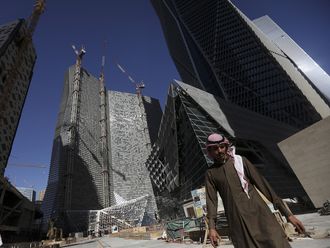Shanghai: China's key stock index fell by four per cent yesterday, driven by retail investors who were alarmed by rumours of more aggressive action to control inflation dumping large capital bank and energy shares.
The market suffered most of its losses in a matter of minutes, pushing down US S&P futures to a session low and weighing on the Australian dollar.
The equity market's drop came despite the yield on the central bank's one-year bill, remaining flat at auction, which bond traders interpreted to mean the People's Bank of China (PBOC) did not have the intention of ramping-up tightening further for now.
The Shanghai Composite Index was down by just 0.7 per cent by midday, but then dropped quickly after the afternoon session started, plunging by as much as 4.3 per cent at one point and dropping below its 250-day moving average, considered an important level in the domestic market.
Nerves have been frayed in China after a 5.2 per cent loss on Friday, the index's biggest single-day fall in 14 months, from which it recovered slightly on Monday. It is now at 2,894.5 points, its lowest level in a month.
"The slump from about 1.30pm is due to new rumours. This was very sudden. It could be a new rumour on interest rate rises as most sectors have fallen and banks have dropped the most," said Wen Lijun, an analyst at Nanjing Securities.
China's stock market, largely sealed off from the rest of the world and where domestic retail investors account for around two-thirds of turnover, has been filled with unsubstantiated talk of tighter lending controls and interest rate increases. Many investors have been quick to sell shares in recent days on the slightest hint of further policy measures to slow the economy.
Two dealers said the market was also responding to fears that the government might expand controls on credit, which have largely targeted the property sector, to industries facing overcapacity, including coal and solar energy.
Commodity weakness
Some analysts pointed to weakness in commodities as another factor. Sharp drops in commodity futures last Friday on rumours of an imminent interest rate rise by the PBOC, were part of the reason for the fall in the market that day. In the bond market, yields were little changed as traders had already priced in expectations for more interest rate rises beginning by the end of this year.
The yield on the benchmark five-year government bond actually fell one basis point to 3.64 percent, after jumping by nearly 100 basis points over the past month to price in more interest rate rises in the pipeline. As a sign of Beijing's continuing worries over inflation, the official China Securities Journal reported yesterday, that authorities would unveil food price controls and crack down on speculation in agricultural commodities as a ‘one-two punch' to rein in food prices.
The central bank raised interest rates in mid-October, and followed up last week by increasing banks' required reserves. Many analysts expect another interest rate rise by the end of this year.
"The trigger was reports about high commodity prices, such as cotton and soybeans, and a possible government clampdown on these prices," said Zheng Weigang, head of investment at Shanghai Securities. Top oil refiner Sinopec was the biggest weight on the index, falling 5.3 per cent, followed by financials, including China Life, also down 5.3 per cent, and Bank of China, which was 3.5 per cent lower.
Turnover picked up to 220.5 billion yuan from 196.1 billion yuan on Monday, but slipped from multi-year highs hit in the past six weeks.











